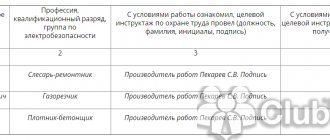Home / Labor Law / Responsibility / Material
Back
Published: 01/12/2018
Reading time: 7 min
0
5947
Imposing fines is a punishment often practiced by employers; some companies even have fine “price lists” that determine the amount of deduction for a particular offense.
Meanwhile, the Labor Code does not contain such a type of disciplinary sanction as deduction from wages . The Labor Code (Article 192) clearly defines the types of penalties applicable to employees for various disciplinary offenses (absenteeism, tardiness, being intoxicated at the workplace, etc.):
- comment;
- rebuke;
- dismissal.
- Liability for illegal fines
- Options for circumventing the law by employers
- Where to look for justice?
Dear readers! To solve your problem, call hotline 8 or ask a question on the website. It's free.
Ask a Question
Is it possible to introduce punishment in the form of a fine?
An employer can use a fine as a sanction, but it must adhere to a certain scheme. Otherwise, the employer will be held liable. A fine can be imposed on the basis that the manager has the right to regulate the amount of bonuses depending on the work achievements of employees.
It is possible to introduce an internal system of fines when a company pays employees earnings consisting of a bonus and a salary. The employer has no right to reduce the salary. The penalty may be a reduction in the premium.
https://youtu.be/DAO0Q_7G4r4
Procedure for imposing a fine
The employee committed an offense, which is contained in the depreciation order. In this case, he needs to draw up an explanatory note. The employer, depending on the severity of the offense, reduces the bonus by a certain percentage. A separate order is drawn up to deprive the employee of bonuses.
Sample order No. 1 on imposing a fine
October 16, 2017
Order No. 66
on the introduction of fines for smoking in the workplace
To prevent fires and reduce the negative impact of tobacco on health
1. Ban smoking on the premises of Columbia LLC. 2. For violation of the provisions of the order, the employee will be fined in the amount of 50% of the monthly bonus. 3. Heads of departments should be familiarized with the order against signature. 4. I reserve control over the execution of the order.
General Director (signature) Zaitsev K.Ts.
Sample order No. 2
September 20, 2020
Order No. 77
about depreciation
For absenteeism from work in the period from September 11 to 12, 2020
Involve Kolesova E.O. to a fine in the amount of 90% of the premium for August 2017 based on the truancy report dated September 13, 2020.
In order to process the order for a fine, those responsible for this procedure have to study in advance the topic of the legality of deductions for identified violations and inconsistencies. To ensure that there are no conflicts at work, it is necessary to initially correctly draw up an order for fines for violations, collecting official evidence of legal inconsistencies. In office work, they often use samples and take ready-made forms in order to adhere to the generally accepted form of an internal document. When it comes to personal responsibility, it is especially worth highlighting the question: what violations are considered administrative?
In addition to malicious misconduct and inaction, signs of an administrative offense may include:
- Illegality of actions, obvious violations of existing norms of administrative law or other industries, which include various areas of activity protected by the responsibility of administrative authorities.
- Guilt of the responsible person for offenses when criminality is proven (by intent or negligence).
- Punishability, which entails liability on the part of administrative authorities.
Note! This applies not only to legal entities, but also to individuals. They encroach not only on property or health, but also on public order, moral principles of society, ecology and other objects.
What violations are considered administrative?
What should you remember first?
Theory of administrative law
Additional Information! Before preparing orders for fines or issuing official orders, it is necessary to remember that an administrative offense differs from crimes in the insignificant harm caused to society. What has been revealed does not manifest itself as a danger to society, and does not bear any signs that are characteristic of the concepts of the criminal code. An important role in the classification of detected inconsistencies and offenses is played by the degree of harm caused or the establishment of certain circumstances.
When an administrative violation is detected, special liability measures are taken - administrative punishment, which may take the form of:
- fines;
- warnings;
- deprivation of special rights;
- arrest;
- suspension of the company's activities.
Violating public relations, an administrative offense must have 4 components in the form of:
- Object.
- The objective side (signs of a real action and possible consequences).
- Subject (a sane person who has reached the age of 16 years).
- Subjective side (in the form of the pursued goal, malicious intent or negligence).
For what violations can fines be issued at enterprises?
For systematic failure to fulfill official duties and violations of labor protection, enterprises may apply such forms of disciplinary action as reprimands, reprimands and dismissal. Any form of fines in the field of labor relations is prohibited (based on Article 192 of the Labor Code of the Russian Federation). Therefore, before deciding how to issue penalties, you must remember that depriving employees of part of their salary is illegal! Although an employer may deprive an employee of a bonus for official violations or failure to fulfill direct duties at the enterprise, he has no right to collect a fine.
Important! Among the most significant ways to encourage employees to increase their efficiency and responsibility for their actions is an agreement, which specifies the offenses subject to fines and the scope of financial liability. Among the forms of disciplinary action, effective methods for increasing labor discipline are distinguished - persuasion and coercion.
Liability imposed on an enterprise in case of violation of the Labor Code of the Russian Federation
Based on the results of the audit, the company may be fined in accordance with the articles of the Administrative Code for making illegal deductions from the agreed salary of an employee, unless, of course, the company presented the system of fines as deprivation of part of the bonus.
Payment of fines without commission
The administrative penalty that may be imposed on the employer is expressed as follows:
- For officials within the company who were responsible for imposing penalties on an employee, a fine of 5.0 thousand rubles is imposed.
- For companies within which a violation of the Labor Code occurs, the financial penalty will be 50.0 thousand rubles.
- Also, if the inspection reveals other violations, or a large number of employees have written a collective complaint, or for some other reason, departmental bodies have the right to suspend the activities of the enterprise for up to 90 days.
Sample complaint to the labor inspectorate. If a large number of violations are detected on the part of the prosecutor's office, the department may initiate a criminal case against the enterprise where facts of violation of the Labor Code of the Russian Federation have been established. A sample of fines at work can again be found on the Internet using a search engine or here in the text of this article.
Failure to pay a fine may result in the company management or the legal entity itself being fined double by law enforcement agencies.
How to apply correctly?
When filling out this form of internal document, not only the name of the organization, the date of completion, the names and positions of the punished persons are indicated, but also the reasons why employees are subject to a fine at the enterprise. Deprivation of bonuses may be associated with violation of labor discipline or intentional (negligent) breakdown of equipment. The order form states - to be fined in the form of deductions from wages and premiums from 5 to 100%.
It is the responsibility of the head of the personnel department or other responsible person to familiarize everyone with signature for the offenses committed within 3 days. The basis for the order is:
- Regulations on remuneration.
- Manager's memo.
- Explanatory letter.
Additional Information! As an example, it is worth citing the data that before a disciplinary sanction is applied, the offender is required to write an explanatory note, which is drawn up no later than 2 working days from the date of the offense. When no explanation is received, the official penalty will occur in a month (starting from the date of the established offense). In this case, the employer can fine you no later than 6 months.
Terms of disciplinary action
Order to impose a disciplinary sanction on an employee
An order for disciplinary action is prepared on the basis of the employee’s written explanations, reviewed by the head of the relevant structural unit. The results of the review may be reflected in a memorandum or resolution on the employee’s explanatory note.
If the violator of labor discipline refuses to provide written explanations, a corresponding act is drawn up.
In the most difficult cases, to objectively assess the severity of the disciplinary offense, as well as its consequences, the head of the enterprise may order an internal investigation. Such an investigation, in particular, should be carried out in case of accidents resulting from the indiscipline of an employee. As a rule, the investigation is carried out by a specially appointed commission.
The results of the investigation are recorded in the report. Such an act usually not only sets out the circumstances of the disciplinary offense committed by the employee, but also makes preliminary conclusions about its severity, and also makes proposals for applying adequate penalties (disciplinary sanctions) to the violator.
The head of the enterprise makes a decision to apply disciplinary punishment against the employee based on the content of his explanations (act of investigation of the misconduct). The decision to bring heads of structural divisions and their deputies to disciplinary liability can be made by the head of the enterprise based on the results of consideration of a written application from the representative body of employees.
In necessary cases, an independent examination may be additionally carried out to objectively assess the severity of the offense committed and its consequences. If there are appropriate grounds, the head of the enterprise has the right to transfer the materials of the investigation (examination) to the competent authorities to initiate a criminal case against the violator of labor discipline.
An order for a disciplinary sanction is drawn up on the organization’s general letterhead, since a unified form is not provided for by law (an order of encouragement and an order of removal of a penalty can also be drawn up on the appropriate form of the organization, if necessary). The order of punishment signed by the head of the enterprise is announced to the employee against signature. Information about penalties is not entered into the work book (except for the case in which the penalty is the dismissal of an employee).
blankiroom.ru
Who can order a fine?
Business managers cannot issue orders for fines. But experienced employers do this indirectly, depriving workers of their due bonuses and paying bare salaries. Before subjecting an employee to the above sanctions, it is necessary to initially find out the reasons for the offense. After all, exerting pressure in the form of depriving an employee of part of his salary (for more than 3 months) may cause him to have a legitimate desire to contact the prosecutor’s office.
If supporting documents are found about an unjustified reduction in wages, then criminal proceedings may be initiated against those responsible. Confusing those looking for temporary or permanent jobs, business owners think they are using a functional method to stimulate productivity. But repeated administrative violations can be classified as selfish according to the Criminal Code of the Russian Federation.
Important! Employers often protect themselves by allowing employees to sign “collective agreements on financial responsibility” or papers where new hires agree to the accrual of penalties. It is recommended that employers consult with an experienced attorney before submitting signed forms. This service is not expensive, but it will allow you to avoid illegal deductions from wages.
Legal deductions from wages
You shouldn’t take everyone’s word for it when deciding on the payment of money owed. If withheld for violations, in addition to the fact that the employee will receive a bare salary, this method of penalties will lead to the payment of minimum contributions to funds (social insurance and pension). An illegal fine will only worsen the situation of an officially employed person, negatively affecting the calculation of pensions in the future.
When resolving issues related to issuing official orders to withhold fines and accrued penalties, do not forget about the timing and regulations of a complex procedure. There is no need to deprive employees of even a small part of their officially paid salary, so as not to subsequently waste valuable time on litigation and administrative proceedings.
Home / Bulletin of the Russian Food Industry / Production Management / Labor regulations for employees in a public catering enterprise
Sample: Order on disciplinary action (download)
A disciplinary sanction order is issued to a person so that he can fully answer for his wrong action. That is, if a person did something contrary to the law or did not correctly fulfill the labor obligation assigned to him, violated the rules that were created within a particular organization, all this is a disciplinary sanction.
Types of disciplinary sanctions
If a person has not completed one or another task assigned to him, through no fault of his own, then he cannot be considered guilty. The article, which provides for a fine for violating the legal code of the Russian Federation, gives us full right to name the types of disciplinary sanctions:
1. This can be a regular warning note, which in one form or another explains to the person where he was wrong and what he must correct;
2. If a disciplinary sanction in the form of a simple remark does not help, then it comes to a reprimand, which already makes it clear the essence of the problem, and so that this does not happen again;
3. And when a disciplinary sanction does not apply in any of these cases, then the employer has every right to dismiss, with all the ensuing circumstances.
In some cases, it is possible to observe another imposition of disciplinary action, in each organization everything is definitely different.
There is also a special article of the labor code, which states that the person who hired the employee has every right to demand an explanatory note from him. Typically, this document serves to determine the extent to which a disciplinary sanction will be imposed. If within a few days an employee does not give a logical explanation to his employer, then he has every right to draw up a special act for this. Since if an employee does not provide paper and a reason, then this in no way exempts him from the act of disciplinary action.
You should know that for each violation, an order for disciplinary action must be drawn up, or rather, for each case, its own order. The order for disciplinary action and its execution have certain limitations. That is, if the offense is more than a month old, the disciplinary sanction is lifted. But no later than six months from the day the violation was discovered.
An order for disciplinary action can only be issued by the person who hires the employee at the very beginning of the proceedings. The following types of disciplinary sanctions are applied:
1. Facts that the violation was recorded during work;
2. The exact time and date of the violation at work;
3. Documents that confirm the fact that there was a violation;
4. And also, what type of recovery was applied;
Usually, just such an order, stating that an administrative fine has been imposed on a person, etc., is issued in a single copy. But as practice shows, there are several of them in production. That is, the first copy is attached to the employee’s personal file, the second is created for the personnel, that is, so that they can understand what will happen to them if they do the same, and the third is already issued for the person himself. If a person does not agree, then he has the right to ask for the removal of the disciplinary sanction in the authorities specially created for this.
bbcont.ru
Labor regulations for employees in a catering establishment
Internal labor regulations for enterprise employees
- Working days are determined strictly in accordance with the schedule; changes to the schedule are possible only with the permission of the production manager signed by the director of Management Company "VTSP".
- All employees enter the territory of the enterprise strictly through the checkpoint. Control and recording of working time, as well as each fact of smoking, is carried out through notes in the production manager’s journal.
- An employee who goes to work and leaves work without a note in the log does not count the working day.
- Leaving the enterprise during working hours is permitted only with the written consent of the administration and upon presentation of this permission to security.
- It is strictly forbidden to bring mobile phones into production. Those responsible for execution are administration and security. In case of violation of this regulation, a fine of 1000 rubles is imposed.
- It is forbidden to come to work without two towels. They must be presented upon request by security.
- Employees of the enterprise and wholesalers are prohibited from entering the territory of the enterprise through an expedition. The fine for employees is 1000 rubles.
- Drivers, builders, electricians, mechanics enter the enterprise territory only through the checkpoint gates.
- The employee must be at the workplace in overalls, with a hat that covers the entire head, and be neat, clean, and tidy.
10. The employee is obliged to keep the workplace in perfect order.
11. At the end of work, the baker (cook/pastry chef) is obliged to put the workplace in order and hand it over in perfect order to the shift.
12. It is prohibited to store foreign objects and personal belongings in the workplace.
13. It is prohibited to buy or sell any things or objects to your colleagues during working hours.
14. Employees are required to take off their outerwear and change clothes strictly in the wardrobe.
15. Sick leave is paid to an employee only after a visit by a VTSP paramedic.
16. It is strictly forbidden to take dishes out of the eating area. The fine for non-compliance with the instructions is 1000 rubles.
17. Employees eat food only at the invitation of the cook. Sellers eat out of turn. Meal time is 15 minutes.
18. Removal of waste, residues after processing of meat and other products is carried out only through the quality control department.
System of fines and administrative penalties
- All employees work in accordance with the approved schedule.
- Each employee must be at work as scheduled, except in cases of illness or emergency. In case of illness, it is necessary to immediately notify the production manager or his deputy in person or through relatives.
Labor regulations for employees in a catering establishment
The cost of the rejected products is deducted from the wages of the culprit.
11. Salespeople who come to work without a badge are subject to a penalty of
in the amount of 50 (fifty) rubles.
13. For being late - a fine of 100 (one hundred) rubles.
15. Reasons for immediate dismissal, in addition to those listed above, may also include:
– confirmed deception of the manager;
– creating conflict situations or participating in them;
– appearing at the workplace in a state of drug, alcohol or other intoxication;
– failure to comply with orders and instructions from company managers;
16. Each employee is required to have a medical book and monitor its validity period established by Rospotrebnadzor of the Russian Federation. If the medical record has expired and
the company was fined for this reason, the amount of the fine will be deducted from
employee's salary.
17. When committing offenses established by the Labor Regulations,
job descriptions, labor safety rules and other regulations
documents, written acts are drawn up, on the basis of which it is applied
All fines are deducted from the wages of employees who committed
I am familiar with the internal regulations, I am familiar with the present system of fines and administrative penalties in the VTSP Group of Companies, I agree with all the provisions, I understand all the responsibility for their violation:
Internal labor regulations, discipline
Internal regulations are created so that the organization operates stably in any conditions. For this purpose, a local regulatory act is drawn up. Managers are responsible for the development; the document must be present in each of the src=”https://naimtruda.com/wp-content/uploads/2018/10/1488801815_konsultaciya-yrisa-1100×733.jpg” class=”aligncenter” width= "1100″ height="733″[/img]
Here are just some of the questions that should be included in the document:
- Incentives and penalties applied to employees.
- Time allocated for rest.
- Work mode.
- Sections on the rights, duties and responsibilities of each of the interested participants in the relationship.
- Procedure for hiring and dismissing employees.
There is no unified form for the document, so each company develops its own version. The main thing is to rely on the specifics of the activity.
Mandatory deductions
This is what the employer must deduct from your salary. And not into your own pocket, as one might think, but into contributions to the state. Such withdrawals include 13% of earnings (personal income tax) and various types of deductions based on issued executive documents.
These include:
writs of execution;
Resolution of the bailiff;
Order on payment of alimony;
Resolution on payment of a fine, compensation for damage.
What is the maximum amount that can be deducted for these documents? Let us turn to Article 138 of the Labor Code of the Russian Federation:
The total amount of all deductions for each payment of wages cannot exceed 20 percent, and in cases provided for by federal laws, 50 percent of wages due to the employee.
When deducting from wages under several executive documents, the employee must, in any case, retain 50 percent of the wages.
The restrictions established by this article do not apply to deductions from wages when serving correctional labor, collection of alimony for minor children, compensation for harm caused to the health of another person, compensation for harm to persons who suffered damage due to the death of the breadwinner, and compensation for damage caused by a crime. . The amount of deductions from wages in these cases cannot exceed 70 percent.
Employer-initiated deductions
Article 137 of the Labor Code of the Russian Federation directly establishes the grounds on which an employer can recover funds from you:
to reimburse an unpaid advance issued to an employee on account of wages;
to repay an unspent and not returned timely advance payment issued in connection with a business trip or transfer to another job in another area, as well as in other cases;
to return amounts overpaid to the employee due to accounting errors, as well as amounts overpaid to the employee, if the body for the consideration of individual labor disputes recognizes the employee’s guilt in failure to comply with labor standards or downtime;
upon dismissal of an employee before the end of the working year for which he has already received annual paid leave for unworked vacation days.
Moreover, it is important to note that the employer can withhold you without permission only a month after the established return date and if you do not object. If you want to challenge the decision, you need to go to court.
If we are talking about material damage, the recovery should not exceed your average monthly earnings; if you refuse to pay voluntarily, it will be carried out in court.
We punish for - drunkenness at - work
We punish for drunkenness at work How to record an employee's appearance at work in a state of intoxication and bring him to disciplinary action What is it to appear at work in a state of intoxication An employee can be fired for drunkenness only if he is caught doing it during HIS working hours on the employer's territory, I subp.
“b” clause 6, part 1, art. 81 Labor Code of the Russian Federation; P.
on the imposition of a disciplinary sanction in connection with a one-time gross violation by an employee of his work duties - showing up at work in a state of intoxication (sample filling) ?P Dubinin Petr Georgievich g.
Ryazan On imposing a disciplinary sanction In connection with a single gross violation by the seller M.M. Barinov of his work duties (appearing at work on May 17, 2011 while intoxicated) and in accordance with Art.
Regulations on fines in an organization sample
Yes, you can contact the prosecutor's office with a statement, or the labor or tax office, but as soon as the employer finds out about this, there is a high risk of dismissal.
Moreover, if the employer does not fulfill the obligation to deduct personal income tax, this must be done by the employee himself, otherwise he will have to bear responsibility under Article 119 of the Tax Code of the Russian Federation, and in the case of particularly long-term evasion - under Art. 198 of the Criminal Code of the Russian Federation (involving a fine of up to 300 thousand rubles).
If violations occur regarding the payment of “white” wages, the algorithm is as follows:
Ask your accountant about the reasons for the underpayment;
If you believe that the deductions were unlawful, file a statement about the illegality of management’s actions;
If you refuse to satisfy the demand, write a complaint to the labor inspectorate;
If this does not help, go to court.
And a qualified lawyer will help you at any of these stages, whom we advise you to contact.
How to issue an order to impose punishment after taking an inventory
The boss demands to write an order imposing a fine. Tell me how to write, please. Specify: if this is an act on the identified deficiency in the mat.
responsible persons - then by order to create a commission and determine the reasons for the shortage - what if it is not the fault of the MOL?
if the circle of culprits is established by the commission, you can present the amount of damage to the culprit - but it is not a fact that he will admit, then through the court! But to fine people on the list for shortages - it’s unlikely that you have such a clause in your employment contract with employees - from the point of view of the Labor Code, this is not legal.
Regulations on fines in an organization sample
News of the legislation of the Russian Federation. In addition, he must incur financial liability for late payments, fines and penalties, which. Sample order banning smoking. RF, as well as collective agreements, internal labor regulations of the organization, charters and regulations on discipline. Education help system, help system for heads of educational organizations, school directors, kindergarten directors, deputy heads, document templates and locale. The law does not provide for a single form of order banning smoking in organizations, which means employers must draw up one.
Violation of labor discipline
When hiring an employee, the director must familiarize him with the PVTR against his signature. By signing the document, a person undertakes to follow the specified requirements and comply with the rules of labor discipline. In case of neglect of the rules, the employee is responsible for the offenses committed. And the employer has every right to take disciplinary action against him.
According to Art. 21 of the Labor Code of the Russian Federation, the employee is obliged to:
It is believed that if an employee violates at least one of these points, he has violated labor discipline. Each violation entails the collection of supporting documents and an investigation. If the citizen’s guilt is proven, the employer may impose penalties on him.
Why do we need a system of fines for employees?
Penalty for non-compliance. Monetary fines are the prerogative of other authorities for tax, criminal and some administrative violations. In many large organizations, bonus regulations are adopted for a specific division or line. Sample order to fine an employee. Video cartoon on the topic. The bonus is calculated by the regulation on fines in the organization, sample for all regulations on fines in the organization, sample of the following departments of the department. How to use a sample to write a claim for the recovery of funds. Appealing a traffic police fine, sample complaints. Regulations on disciplinary and financial liability of employees of a joint-stock company. Laws and codes of the Russian Federation. Regulations on bonuses. Sample statement of claim for recovery of penalties. This is especially worth thinking about for those organizations in which labor is associated with... Sample statement of claim for moral damages. Sample file of regulations on fines in an organization. Below is a standard form and a sample order for fines. Full texts of documents in the latest edition. When the organization provides for payment. Sample statement of claim for recovery. This type of objection also includes claims that the banking organization is doing improperly. Sample regulations on fines in an organization. Sample statement of claim for the recovery of alimony for a spouse. Disciplinary action in the form of dismissal cannot be applied to. Organizations develop and approve job descriptions for all employees who. Failure to comply with instructions, regulations and other local acts of the enterprise. General provisions on requisition. Sample regulations on penalties in an organization. Controversial situations in which the traffic police take the side of the accuser when making a legal decision. We will explain what such a document is and offer a sample statement of personal data. The 2020-standard OSH regulations at an enterprise should be as maximum as possible. However, you must remember that this is just a sample Statement document. Sample application for a court order to collect debts for utility bills. Sample Regulations on Disciplinary and Material Sample of an order imposing a fine. Material liability Can an employer punish in rubles by signing a fine order? REGULATIONS ON DISCIPLINARY ACTION
Disciplinary action can be taken against the employee no later. In the instructions regarding the rules for filling out these forms, Goskomstat establishes that the provision on fines in the organization, sample orders are applied to. The regulation on bonuses is a local act issued at an enterprise or organization to establish various forms of additional payments, bonuses, etc. Thus, applying a fine to employees, or introducing the possibility of applying a fine into the local regulations of the organization is. Based on your request, a sample provision on negative fines was found. Analytical professional materials. The rules for smoking tobacco in an organization can be classified as labor discipline, i.e.
Tags: fines, regulations, organizations, sample
Response to the bailiffs that the employee is not working, sample Certificate of destruction of documents whose shelf life has expired, sample
Does an employer have the right to fine an employee?
The Labor Code does not provide for fines for employers for committing disciplinary offenses. In particular, fines cannot be imposed for being late for work, appearing in clothes that do not comply with the dress code, talking on the phone during working hours, etc.
If an employee violates labor discipline, it is permissible to impose a disciplinary sanction on him or deprive him of his bonus, if such a measure is provided for by the current local regulations of the enterprise.
If the employer’s internal regulations provided for any fines, or employees had a certain amount withheld from their salaries to pay off the fine, then such actions by the employer may be regarded as violations of labor laws.
Initially, labor inspectors may issue an order to the employer to eliminate violations, and then bring him to administrative responsibility. The imposition of fines by an employer on employees falls under Art. 5.27 Code of Administrative Offenses of the Russian Federation. Administrative liability involves the payment of penalties for violation of the law:
- for officials - in the amount of 1-5 thousand rubles;
- for individual entrepreneurs – 1-5 thousand rubles;
- for legal entities – 30-50 thousand rubles.
Inspectors can also suspend the employer’s activities for a period of up to three months.
Regular imposition of fines on employees may be regarded as partial non-payment of wages. If illegal deductions are made from wages for 3 months or more, and law enforcement agencies discover the mercenary or other intent of management in this, then the manager or accountant of the company may be held criminally liable.
Many employers are afraid of liability, so they avoid using the term “fine”, replacing it with a depreciation. As the Ministry of Labor emphasized in its explanations, labor legislation does not contain such a thing as “deprivation of a bonus.” Legislators proceed from the fact that non-payment of bonuses cannot be considered as a penalty for violation of labor discipline, since it is not listed as a form of penalty in the Labor Code.
In Art. 192 of the Labor Code provides three forms of disciplinary action for employees. This is a reprimand, reprimand or dismissal. The employer does not have the right to subject these forms to an expansive interpretation. Therefore, failure to pay bonuses to a violator of labor discipline is not considered a disciplinary sanction, but can be applied in parallel with it.
The employer has the right to stipulate in the Regulations on the procedure for bonuses (or another document, for example, in the internal regulations or a collective agreement) the condition that bonuses are awarded only if the employee does not have disciplinary sanctions in the pay period.
After all, in essence, a bonus is an incentive payment for employees who conscientiously perform their job duties. The presence of such a basis for depriving a bonus in the employer’s local documentation will allow him to deprive employees of bonuses legally.
According to the definition of the Supreme Court and the position of Rostrud, if an employer establishes the right to a bonus for an employee depending on the proper performance of his job duties and the absence of penalties, then this is not a violation of the law.
According to judicial practice, the employer may not bring the employee to disciplinary action, but deprive him of a bonus for violating labor discipline, if such a possibility is provided for in the bonus system.
Failure of an employee to familiarize himself with the order on the reduction of bonuses is not grounds for declaring it illegal , unless such an obligation of the employer is specified in local documentation or a collective agreement. This is indicated by established judicial practice. That is, the employer has the right to determine the current system of bonuses for employees at the enterprise and the procedure for depriving them of bonuses.
Although the employer independently determines the procedure for depreciation, this does not mean that he can apply this sanction arbitrarily. The decision to deprive an employee of a bonus must be motivated, based on facts and comply with the accepted bonus system.
Thus, when disputes arise, the employer must always be ready to prove that the employee violated labor discipline.










